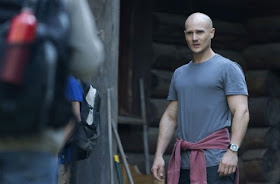For TrustMovies, a new Boaz Yakin film is always a joyful occasion. (Even if the movies themselves are not always so joyful.) From Fresh through A Price Above Rubies, and on to Death in Love, Safe and now his latest genre offering, BOARDING SCHOOL, Yakin continues to give us visually commanding movies with themes that resonate and reverberate tellingly in ways both expected and not so.
With each new film he has written and directed, Yakin has tackled a new genre -- effectively making it his own in the process -- from coming-of-age, Jewish orthodox feminism, and the Holocaust to chase thrillers, dog stories and now, with his latest, the horror film.
The movie-maker (shown at right) is also consistently interested in "the other"; his characters, for many different reasons, don't easily fit it to the "normal" world.
In Boarding School, the protagonist is a teenager named Jacob, played with remarkable precision and depth by young actor Luke Prael (shown on poster, above, and below, right), who is also to be seen in the current indie hit Eighth Grade, who has very odd nightmares stemming from even odder relatives, particularly a grandmother who seems to have had an awful and bizarre Holocaust experience.
When Jacob's behavior grows worse, his surprisingly kindly step-father (David Aaron Baker, center above) and his much less kindly mother (Samantha Mathis, at left, above) send him away to the titular boarding school, where -- he is told -- "clarity" will be achieved in just a couple of weeks. If only.
The other students proves quite the assortment of strange characters, and Mr. Yakin sees to it that each one of them is brought to fine and sympathetic life (and sometimes, death). These young kids are never simply creepy or used for the standard, oddball special effects, and the young actors who play them are remarkable indeed.
The school's headmaster and his wife are portrayed with great zest and skill by Will Patton (above) and Tammy Blanchard (below), and by the time we have uncovered what is really going on here, the movie takes on about as dark a palette as you will have seen in some time.
Visually, Mr. Yakin proves as skilled as ever, giving us some simply gorgeous interior vistas (the boarding school itself is a visual knockout) and a number of set pieces as original as they are creepily fraught with buried meaning.
The talented Prael spends maybe the entire last third of the film dressed in drag, which he pulls off quite beautifully, even as his character grows in intelligence and strength. His is an impressive performance, and the film that surrounds him is even more so. Yakin has given us the most unusual, effective and memorable film in the horror genre so far this year. (And also one of the better, if darker, coming-of-age movies.)
From Momentum Pictures and running a surprisingly lengthy but consistently compelling 111 minutes, Boarding School opens today in theaters (in Los Angeles, see it at the Arena Cinelounge Sunset) and simultaneously on VOD and digital HD.



















































